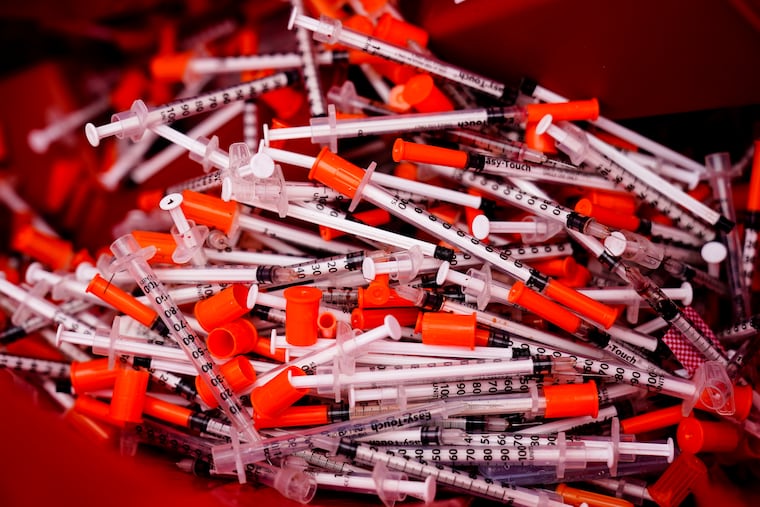Accessible syringe exchange programs can lower drug use and save lives
We need to expand access to ensure they work.

Philadelphia is among the U.S. cities hardest hit by the opioid epidemic. Nearly 1,300 Philadelphians died of a drug overdose in 2021 — a 10% increase since 2019, before the start of the COVID-19 pandemic. In yet another worrisome trend, from 2016 to 2019 there was nearly a threefold uptick in new cases of HIV among people who use intravenous drugs. These trends affect drug users, their partners, families, and their communities.
Syringe services or exchange programs, which provide access to sterile needles and syringes and facilitate safe disposal of used syringes, can help turn the tide. These programs — first implemented in the early 1980s — have been shown to reduce transmission of HIV and hepatitis B and C. In fact, a study based in Philadelphia found that syringe exchange programs prevented more than 10,000 new cases of HIV over 10 years.
But syringe exchange programs can do more than reduce transmission of serious infectious diseases. They can also be an entry to primary care, community-based services, and lifesaving substance abuse treatment programs. People who use syringe exchange programs are more likely to enter substance abuse treatment and stop injecting than those who don’t. Exchange program participants are more likely to report a decrease in frequency of injecting drugs. For all these reasons, the “National Drug Control Strategy” published in 2021 by the Office of National Drug Control Policy recommends increasing the number of syringe services programs across the country by 2025.
It is often assumed that the presence of syringe exchange programs may contribute to increased drug use, crime, or homelessness. But decades of research show that this is not the case. These programs are a critical contact point for many in the community to access services to reduce drug use and its consequences. The efficacy of the programs has been noted by officials at the Centers for Disease Control and Prevention who said that nearly 30 years of research has shown that comprehensive syringe exchange programs are “safe, effective, and cost-saving, do not increase illegal drug use or crime, and play an important role in reducing the transmission of viral hepatitis, HIV and other infections.”
Although syringe exchange programs are illegal in Pennsylvania, they have been operating for years in various municipalities, including Pittsburgh and Philadelphia. In our city, the demand for clean syringes is greater than what our current programs are able to provide. A 2018 survey found that just one in three people who inject drugs in Philadelphia always used a new sterile syringe. The shortage of clean needles has been exacerbated by the increase in the use of fentanyl by drug users; fentanyl has a shorter duration of effect than heroin and has led to more frequent injections — further increasing the reuse and sharing of syringes. Greater access to clean syringes is clearly needed.
» READ MORE: New Jersey lawmakers understand that syringe service programs save lives. Why won’t Pennsylvania’s? | Editorial
For syringe exchange programs to be successful, they need to be in communities and settings where people can most easily access them. Just like we want vaccines to be delivered in doctor’s offices, pharmacies, and community sites, we need syringe exchange access in all Philadelphia neighborhoods that need them and offered by community-based organizations, medical providers, emergency departments, and other parts of the health and social services system.
Multiple strategies are needed to reduce the public health impact of drug use in Philadelphia. Accessible syringe exchange programs are one important evidence-based component that can improve public health by increasing access to lifesaving services for people who use drugs. We need more investment and access to syringe exchange programs to address the adverse impact of drug use disorders in our city.
Ana V. Diez Roux is the dean and distinguished professor of epidemiology at the Dornsife School of Public Health at Drexel University. @adiezroux Jennifer Kolker is the associate dean for public health practice and clinical professor of health management and policy at Dornsife. @kolkerjennifer